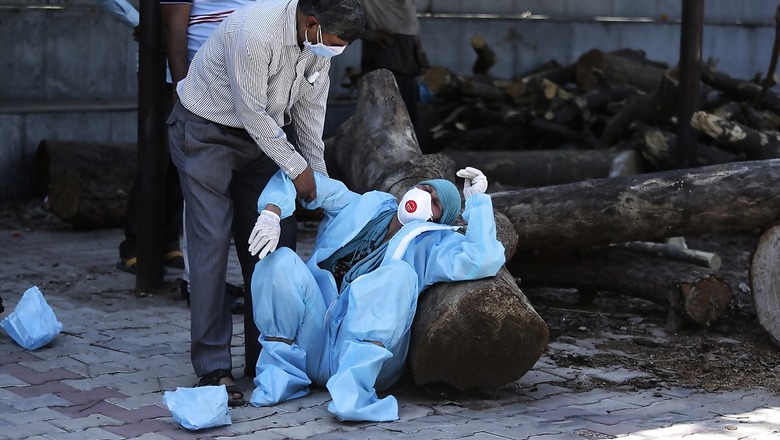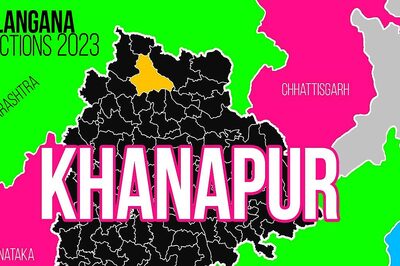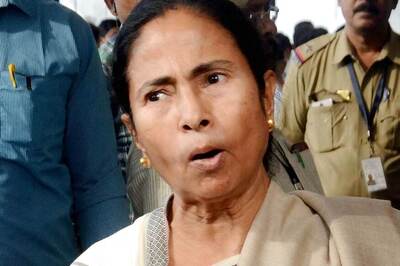
views
The Union government on Monday said the management of COVID-19 across states and districts would be by following three main principles — containment, clinical management and community engagement. Physical distancing, use of masks and hand hygiene have to become a part of life, the government said.
Addressing a joint press conference with other senior functionaries, Joint Secretary in the Ministry of Health and Family Welfare Lav Agarwal said many people have been found to be occupying hospital beds out of panic. He said there is no need to panic and urged citizens to follow norms. “Hospital admissions should be done only when needed and only one advice of doctors,” he said.
Niti Aayog member Dr VK Paul said time has come to wear masks even at home, especially if there is any infected person around. “Please don’t go out unnecessarily, and even within the family wear a mask. Do not invite people into your home,” Dr Paul said.
Regarding containment, the Union Health Ministry said controlling human host through effective isolation is the key to manage the spread of the infection.
Limit the spread of infection by limiting unnecessary movement
– Following COVID-appropriate behavior at all times to contain the spread and break the chain of transmission
– Early identification is the key for any infectious disease management
– Get tested as soon as any symptoms are noted
– Isolate yourself even while waiting for the test results
As far as clinical management is concerned, the following points were made.
– Managing stress on healthcare delivery systems
– Effective monitoring of home isolation cases
– Need for seamless hospitalisation for eligible cases
– States and districts have to plan a dashboard indicating availability of beds and ensure transparent allocation
– States and districts have to plan additional healthcare infrastructure particularly in areas reporting high surge in cases
– Undertaking clinical management as per National Clinical Management Protocol for COVID-19
– Rational use of oxygen, appropriate prescription for drugs under investigational therapy like Remdesivir, Tocilizumab, etc. is critical.
– Equally efficacious drugs which are part of clinical management protocol and widely available to be prescribed
Amid a shortage of medical oxygen, the government said India has enough medical oxygen available, but the challenge is to transport it to hospitals. The government said states have been directed to not give medical oxygen to industries (baring a few). Oxygen storage capacity has also been increased, a senior official said, adding the government is hiring tankers from outside that would be used like ambulances and green corridors would be made.
Dr Paul said misinformation is being circulated around receiving jabs during menstruation. “COVID-19 vaccination can be administered during mensuration period,” he said.
Agarwal said that however much infrastructure is created, it will come under stress looking at the population of the country and added that it is important to curb the infection. The government stressed on continuing vaccination of people, even at a faster pase, and maintaining COVID-19 appropriate behaviours.
Research has shown that if no physical distancing measures are followed, one person can infect 406 people in 30 days, it said, adding that if physical exposure is reduced by 50 per cent then one person can infect around 15 people during the period. And, if physical exposure is reduced by 75 per cent, then one person can infect around 2.5 people in 30 days.
The government said so far, a total of 14.19 crore of doses against the coronavirus have been administered. Among those above 45 years of age, 9.79 crore have received the first dose and 1.03 crore have been administered the second dose. As many as 92.98 lakh health care workers have received first dose, while another 60.08 lakh received the second dose. Among frontline workers, first dose has been administered to 1.19 crore and second dose to 63.10 lakh. Ten states have administered first dose to more than 90% of the registered HCWs. While the national average of vaccination is 79.18%, for those above 60 years, the national average is 36.1%.
The country recorded 3,52,991 cases, the highest so far, taking the tally of cases to 1,73,13,163 while active cases have crossed the 28-lakh mark, according to the Union Health Ministry data updated on Monday. The death toll increased to 1,95,123 with a record 2,812 new fatalities, the data updated at 8 am showed.
(With agency inputs)
Read all the Latest News, Breaking News and Coronavirus News here. Follow us on Facebook, Twitter and Telegram.




















Comments
0 comment